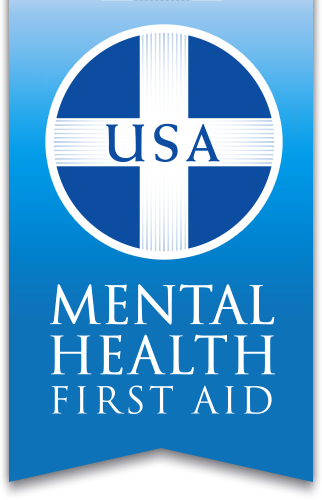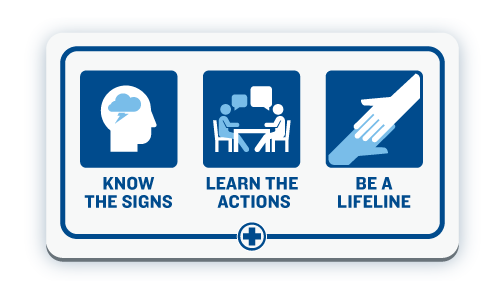On
April 18th &19th, I attended a free two-day Mental
Health First Aid training. It is $130 fee for anyone interested in attending, but
as of now the state of California is offering it for free. The training is
available in Spanish and English. It is provided by the Mental Health America
of San Diego County. It was held at the Casa Familiar Recreation Center in San
Ysidro, California. The environment was very welcoming and many Zumba members
joined in after they got done exercising.
The
Mental Health First Aid training is proven to be effective and is evidence
based. This program originated in Australia in 2001 and has become available
worldwide. Mental Health First Aid USA is listed
in the Substance Abuse and Mental Health Services Administration’s National
Registry of Evidence-based Programs and Practices. After an individual
completes the training they are certified for three years as Mental Health
First Aider.
 |
| Certified Mental Health First Aiders! |
Amanda Cox is a licensed marriage and family therapist. She is also an instructor at the Mental Health America of San Diego County. Mrs. Cox began her instruction by informing us that it takes about ten years for person to realize they have a mental health illness. Which is shocking and should not be taken lightly. She conducted the two-day training in which she explained the signs and symptoms of several mental health illnesses that occur in our society such as, depression, anxiety, schizophrenia, psychosis, bipolar disorder and substance abuse. The course is designed to help participants understand what they can do to help individuals with mental illness. It is also designed to provide participants with information about the many resources that are currently available such as local mental health resources, support groups, and individual counseling. I attended the Mental Health First Aid training in Spanish for two reasons. The first reason was that I wanted to brush up on my Spanish vocabulary on mental health. Since San Diego has many Spanish speakers, I felt that obtaining the knowledge in Spanish would be helpful. The second reason was because I was interested in learning about the different resources San Diego has to offer in regards to mental health. Knowing which resources are available will be helpful as a future school psychologist in order to provide additional resources to parents and students who are struggling with a mental illness.
One
of the topics the instructor emphasized was a five-step Mental Health First Aid
Action Plan known as REDES. This is a Spanish acronym that I will break down to
help further your knowledge about this action plan.
R- Riesgo de
suicidio o autolesion (Assess for risk of suicide or harm)
This step is focused on being aware of
suicidal and self-harming signs. Some of the suicidal and self-harming warning
signs discussed during training were feeling hopeless, withdrawing from friends
and family, acting recklessly, or engaging in risky behavior. This step also
focuses on how to ask individuals if they plan to commit suicide and the steps to help individuals who are expressing suicidal feelings.
E-Escuchar sin juzgar (Nonjudgmental listening)
This step focused on listening with the
heart and ensuring individuals feel respected and comfortable expressing their thoughts
and feelings. The instructor, Amanda Cox, emphasized the importance of verbal
and nonverbal skills such as eye contact, having an open body approach when
consulting with a patient, sitting an arm length apart.
D-Dar informacion
con respecto (Give reassurance and information with respect
This step focused on helping individuals,
who are experiencing mental health symptoms obtain resources in a respectful
way. Mrs. Cox elaborated that mental health has negative stigma and as Mental
Health First Aid participants we must provided resources in respectful and
reassurance way by not blaming individuals for their symptoms.
E- Estimular el
use de ayuda professional adecuada (Encourage appropriate professional help)
This step focused on providing different
resources to help individuals who are experiencing a crisis or signs of a
mental health illness. Mrs. Cox provided resources provided by San Diego County
and explained the importance of being familiar with different resources in our
community in order to provide mental health first aid.
S-Sugerir
estrategias de autoayuda y otras estrategias de apoyo (Encourage self-help and
other support strategies)
The
five step Mental Health action plan is appropriate to use with all ages,
genders, and mental illness. This action plan helps not only future mental
health professionals, but also anyone that wants become an active bystander in
helping individuals dealing with mental health illness. It can also be used to
bring awareness of mental health to schools by teaching students and staff the
early warning signs and symptoms of mental health and what they can do to help.
The
five-step action can be linked to any counseling therapy; however it would work
great using solution focused therapy. Solution therapy focuses on helping
clients find exceptions and strengths within their circumstances. Using solution
focused therapy would help set a goal and focus on living a life without the
problem inhibiting their daily life. This theory would also work great because it
separates the problem from the person and allows the individual to live a life
that is not manifested by the illness. A way to measure the effectiveness of
using solution focused therapy would be the use of scaling. Scaling would allow
the counselor to gather qualitative and quantitative data about how the individual is coping
with their mental illness.
Although the five-step action plan focuses
on actively listening and proper body language, it fails to promote the
importance of rapport building. During the training rapport building was not emphasized enough. Some individuals do not feel comfortable expressing their
feelings to a person they just met. A recommendation for future Mental Health First Aid courses would be to promote the importance of rapport building and discussing the importance of building rapport before counseling individuals. As expressed in class, rapport is one of
the most vital components in making individuals comfortable expressing their
feelings and allow counseling to be a safe and comfortable place.
I
plan on incorporating this technique when interacting with students who are
developing signs of any mental illness. Not only do I have knowledge of the
resources, but I am reminded of how important it is to listen with an open
heart and to be non judgmental.
Best,
Maricela Solis
SDSU School Psychology Trainee
Resources:
http://www.mentalhealthfirstaid.org/cs/take-a-course/



No comments:
Post a Comment